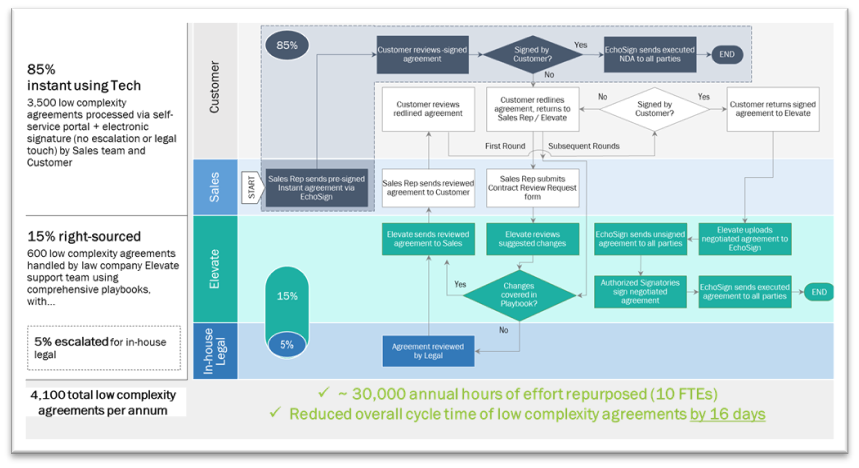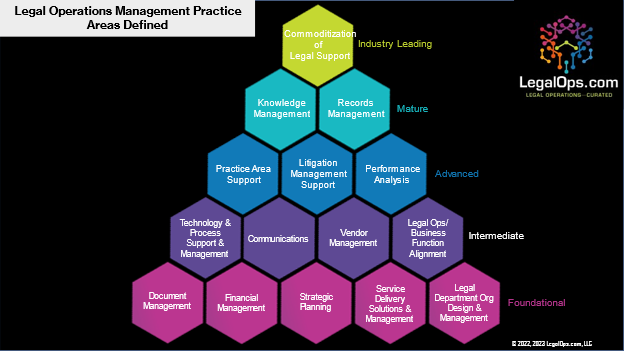What Does It Mean to ‘Run Legal Like a Business’?
September 19, 2023
general counsel legal operations law department corporate law
Among the most impactful shifts in corporate law has been towards running law departments more like businesses. It may seem crazy that doing so is considered a shift – how else would a law department run if not like a business? But for decades, most law departments at most companies operated like a prestigious, internal white shoe law firm incurring high spend in exchange for high-value legal advice designed to keep the executives and the business safe.
Increasingly, corporate leaders view their company’s legal function (‘Legal’) in terms of its direct contribution to enterprise value and profits. The paradigm centres on deciding the best balance between protecting the company and enabling the business. This shift repositions the legal team as a department with which a company’s other profit-and-loss units want to collaborate instead of Legal being perceived as a hindrance. This shift coincides with the general counsel role growing to encompass informing and influencing corporate growth strategy rather than constraining what a company does and focusing on limiting the damage from corporate activities gone awry.
But what does it mean, in a real sense, to run Legal like a business? The question is especially timely with the approach of the inaugural LegalOps.com Running Legal Like a Business conference (Oct 15 – 18 in Las Vegas).
Answering that question has long been a focus for my Elevate colleagues and me (see, for example, our 2016 book chapter, ‘Running the Department with Business Discipline’), and our work partnering with general counsels has given us a clear understanding of what run-like-a-business law departments do that ‘regular’ law departments don’t. Specifically, a business-oriented law department focuses on five fundamental concepts:
1. Outperformance: Increasing the gap between the cost of Legal and the company’s revenue as the company scales, thus contributing to company profit and earnings per share.
Example:

A ‘business-like’ law department must – like any business – deliver net margins on an ongoing basis. Doing so requires ‘bending the legal cost curve’ by delivering legal services to the company using better (e.g., less expensive, more efficient, etc.) ways whose cost will rise less quickly than company revenue. As illustrated in the graphic above, that can mean:
- optimising external legal spend
- leveraging law companies for run-the-company and certain types of context-specific legal work (e.g., work concerning non-competitively-advantaging activities)
- enabling the business with self-serve processes for low-risk tasks
- aligning the activities of senior resources with core business lines
- using data to drive proactive risk mitigation to prevent downstream litigation
2. Faster and Smoother: Enabling business functions to pursue, progress, and close transactions (buy- and sell-side) more rapidly and with less internal friction.
The stereotype of ‘lawyers getting in the way of the business’ has a strong basis in reality. Run-like-a-business law departments reorient themselves to, as much as practical and prudent, not so much as ‘get out of the way’ but rather enable the rest of the business. Pivoting includes shifting low-risk or low-complexity work back into the hands of the business by leveraging templates, playbooks, and technology to provide business colleagues ‘self-service’ for high-volume activities and routine transactions that prioritise speed. To do so, members and leaders of law departments must develop a new mindset that accepts that not all routine or low-risk legal issues require legal ‘touch’ and attention.
The fruits of making that mental shift can be substantial. In the example below, an Elevate corporate law department customer succeeded in moving 95% of their low-complexity agreements to a no-legal touch approach that combined technology and Elevate’s provision of first-level escalation support.
Customer Example:

This example demonstrates the tremendous benefits that workflow technology and right-sourcing can achieve: in this case, 10 FTEs worth of annual effort saved and a reduction of 16 days in cycle time on routine, low-complexity agreements. We believe workflow technology, particularly by using AI, will increasingly integrate digitised playbooks and rules and, eventually, evolve to perform routine automated actions that assess and guide the user to the right outcome with even less legal touch.
3. Better Able, Better Balanced: Building robust capabilities that balance legal, business, and other important considerations.
Running Legal like a business is not solely about generating profits for the company. Just as a strong business balances operational factors related to economic performance, corporate values, organisational culture, and broader concerns (e.g., sustainability), so must a business-oriented law department.
In operational terms, this means developing departmental capabilities – functional ‘practice areas’ rather than legal ones. The greater a law department’s range of capabilities, the greater its capacity to add value relevant to a business’s concerns and goals. The appropriate parameters of a department’s functionality depend on the law department, business, and industry in question, but a good starting point comes from LegalOps.com:

(CLOC and ACC Legal Operations also have models addressing the topic).
In assessing the adequacy of law department capabilities, three questions are paramount:
- How important or aligned is this category of capabilities to the corporate business goals and strategy?
- What does success look like for us in this category, and how are we measuring our performance?
- What key activities will we complete over the next 24 months to improve our performance in this category?
4. Measurement: Selecting and actively using metrics to speak the language of the business, tell narratives, make decisions, and guide the business on how to grow effectively with less risk.
Although law is not a science, lawyers know that evidence matters. Ironically, numerous law departments struggle to pick and apply basic metrics that ‘speak’ the language of the business by tracking and quantifying the value that Legal delivers to the enterprise.
Part of the difficulty has been the lack of a standardised and comprehensive set of metrics relevant to what law organisations do. To help address the problem, Elevate, PWC NewLaw Australia, NetApp, IsInspired, and LegalOps.com together developed and, in 2022, launched the LegalOps.com Legal Metrics Portal, a free online resource for general counsel and legal operations leaders seeking the right metrics to document their department’s value, tell its story, or make decisions that involve legal and business considerations.
5. Make Money: Engaging in legal activities that generate income for the company.
Few people view law departments as revenue generators. But there is no better way to demonstrate that Legal is thinking and running like a business than by doing work – especially affirmative litigation activities – that help either recoup or obtain monies owed to the company. The windfall can add up – all of it directly attributable to the actions of the law department.
Maximising this type of revenue requires minimising direct law department costs for the matters involved. It frequently makes sense to outsource and leverage a cost-effective solution for handling such work. Outsourcing it has the added benefit of making it easy to track its ROI – and to regularly demonstrate to executive leadership the law department’s direct contribution to the bottom line.
Practice and Science
Running Legal like a business is both a practice and a science. It requires a commercial-first mindset from law department leadership and a diverse team of lawyers and operations professionals who can tackle both the practice and business of law. The entire law department must remember that although they represent a corporate function – ‘Legal’ – they even more so serve the company and the ultimate goals of its customers and shareholders.
If you attend next month’s Running Legal Like a Business conference, we welcome you to ping or find us to connect and discuss our experience further. If you will not be there but wish to receive additional materials or set up a virtual discussion, please email contact.us@elevate.law or, even better, complete the ‘Contact Us’ form below.
Back to Expertise


